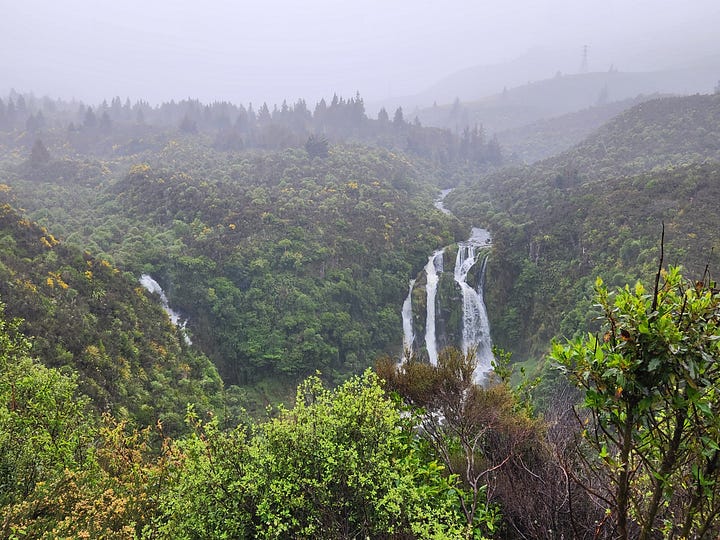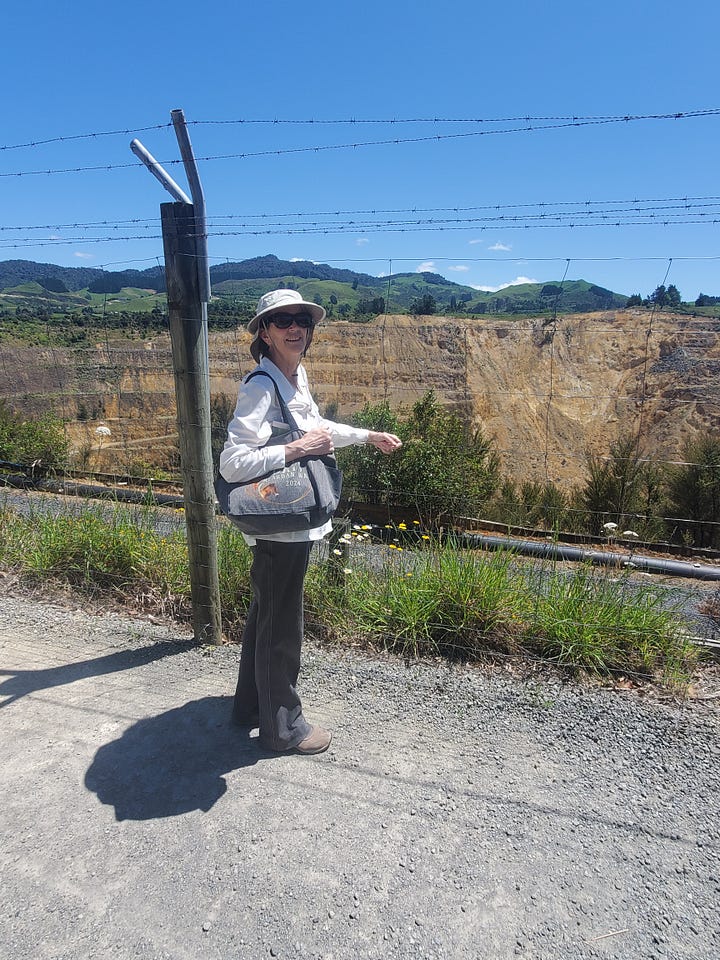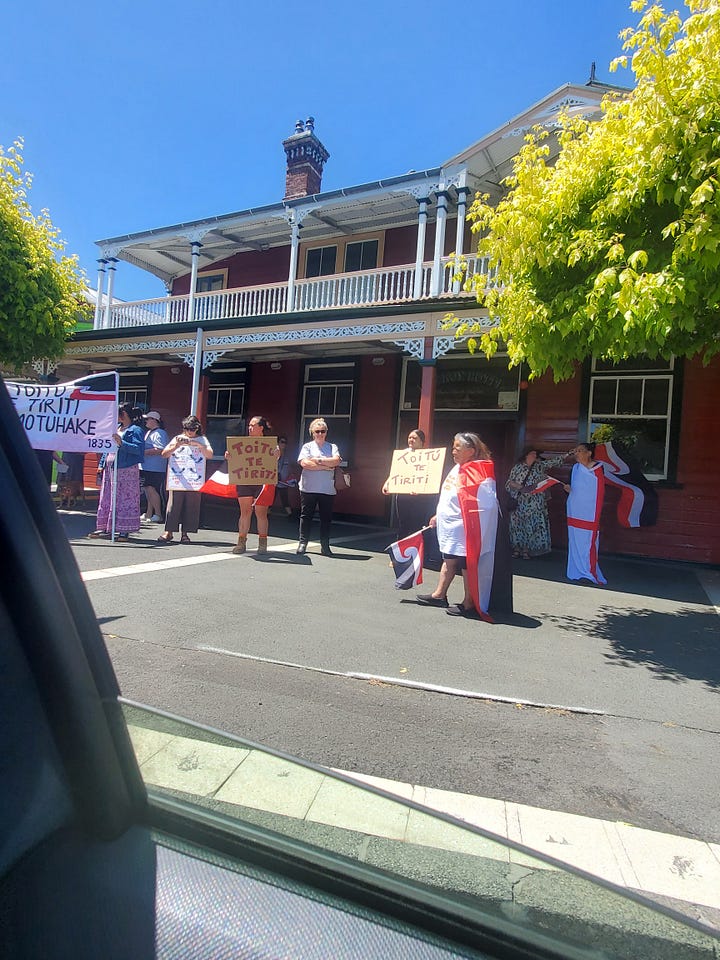Notes from the journal
Last Saturday was our day to drive north on North Island through beautiful landscapes of steep hills, waterfalls, rain and road detours. One of those unexpected side trips put us in a country lane where we spotted a lost lamb standing stunned next to the road at the foot of a steep embankment. We think it snuck through the fence and tumbled over the bank, then couldn’t figure out where everybody went! Craig herded it back around the corner to the field and helped it over the fence.
We were on our way to visit an operating sheep station outside Napier, New Zealand, a contact made in the virtual world over regenerative agriculture that translated into instant connection in their living room. It turned out we share many common values on faith, family, farming and politics. Craig toured the farm with Dave, discussing challenges in farming and ranching. They share a mindset toward regenerative agriculture, defined as working with natural processes to build healthy soil, reduce artificial inputs and make a profit. Farmers can talk the language of agriculture anywhere in the world.
The subject of politics came up in ordinary conversation with Audrey. Their friend circles had been praying for a Trump victory in the US presidential elections, fearing Harris and her party in leadership could destabilize their own coalition government. They cheered the election of the Republican coalition led by Trump as a necessary push back on an unwanted global progressive agenda and having a better ability to tamp down escalating tension with China.
We shared opinions on our respective governments handling of COVID-19, overselling an experimental vaccine without allowing for personal weighing of the risks and benefits. Audrey described problems in the NZ public school system with lack of discipline and too much progressivism, problems frequently making the news in the US. She is homeschooling her daughters after bullying incidents went unchecked. Her first choice, the local Christian school, was full as even secular parents have pulled their kids out of public school to dodge a leftist ideology confusing sex and gender.
It all sounded so very familiar. Their world view would fit easily into my own conservative rural county. And it turns out political polarization is a worldwide phenomenon. I’m not sure if that makes me feel better (whew - it’s not just us) or worse (it’s not just the US?).
A few words on political coalitions
The coalition winning the 2024 US election had a familiar element resonating with folks accustomed to a parliamentary form of government. What Trump and RFK Jr campaigned on as the Unity Party is similar to the current New Zealand government.
New Zealand is led by the National party (center-right and akin to our Republicans) in a coalition with ACT New Zealand (right-libertarian, classically liberal) and New Zealand First, known as the NZF (populist and socially conservative). NZF is also described as the Maori party, a constituency that used to reliably vote Labour (center left, akin to Democrats) until Labour started pushing the same progressive agenda that played a role in the Harris defeat. NZF attracts those disheartened by both major parties and has formed coalitions with both National and Labour in the past.
Each of those four parties earned seats in the legislative assembly, but none had a clear majority. In a parliamentary system, the party with the most members has first option to put together a coalition, requiring compromises and sharing power with one or more minor parties to reach a majority. If those minor parties can get a better deal from the runner up, the power can shift.
Minor parties in the United States envy formal parliamentary systems like New Zealand’s for their defined role in brokering elections, but we do have a parliamentary system in the US. Ronald Reagan called it the Big Tent strategy, and it operates before the election. Donald Trump pulled together a winning coalition of center-right, populist, right-libertarian, classical liberal, left-behind Democrats and socially-conservative minorities tired of being taken for granted. Sounds an awful lot like the winning coalition in New Zealand.
Now we’re seeing the power sharing play out just like any parliament anywhere in the world, with deals made for various positions and proposed appointments that U.S. Sen. John Fetterman (D-Pennsylvania) has described drily as “God-level trolling to own the libs.” It’s a great turn of phrase.
Trump may be doing the trolling but it was the popular vote that sent him fishing. What we saw in the United States this year was democracy in action. Actual, messy democracy where experts don’t get the final say but the people do. The people get a say again in two years, and American voters will be watching for the outcomes.
Sometimes the world revolves around US politics, but not always
Our new New Zealand friends are watching too. They’re hoping America will lead the way in pushing back on the progressive agenda on the international stage, and to see a return to peacemaking through deal-making as a first priority. As a very small country uncomfortably close to China, they want a strong US government.
It reminded me of conversations on a trip to Latvia and Lithuania in 2008. A Latvian veteran of the Second Gulf War coalition emphasized how his country relied on NATO and the US to come to their aid if Russia got any ideas of recreating the old Soviet empire. That was before Russia moved into Ukraine, and I’ve thought about that conversation often in the last few years.
But sometimes issues spin at a community level. In one of New Zealand’s North Island districts (kind of like a county), a few homemade signs along the highway objecting to central planning by the local council read “Hands Off Our Homes.” We passed Maori protests in several towns focused on a piece of New Zealand legislation seeking to clarify a treaty between indigenous and immigrant residents signed almost half a century ago. And on the Coromandel Peninsula, the “No Mining” signs were as ubiquitous as the “No Wind Farms” banners in Lincoln and Whitman counties back home in Washington state. Not sure if they were protesting the open pit gold mine that has been operating here for over a century or siting for a new mine.




The intersection of community interests and private land use decisions drives most local politics. Sometimes, as former Speaker of the House Tip O’Neill was fond of saying, “all politics is local.”
Note: Dave and Audrey are not our new friends’ real names; respecting their privacy on a public social platform. We’ve left New Zealand after a lovely week, landed today in Brisbane, Australia. Subscribe to be notified of new content sharing more notes from the journey over the next 20 days!





Great reporting.
Valuable insights